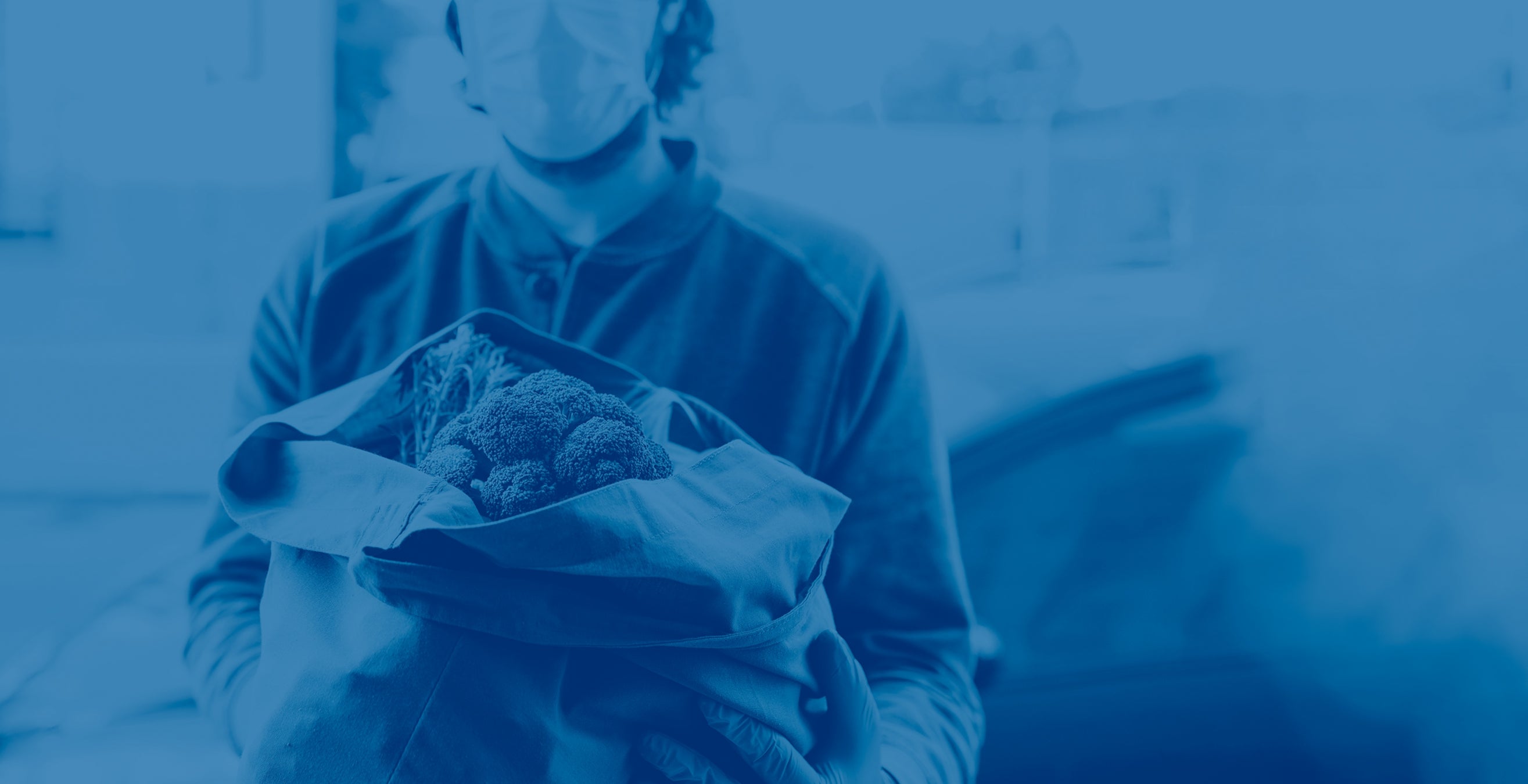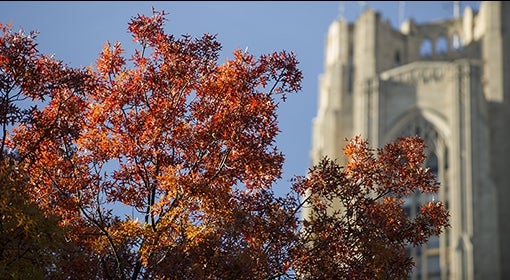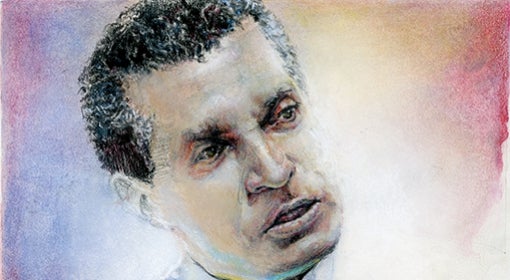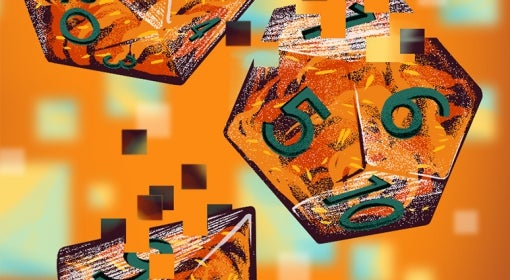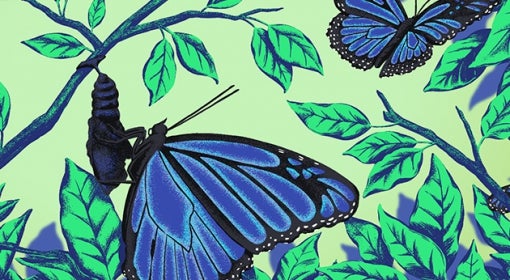The sun has just risen as Felipe Suntaxi prepares to leave the suburb of Sangolquí and make the 40-minute drive on the General Rumiñahui Highway leading to Quito, Ecuador’s capital city. In the back of his SUV are loads of plastic bags full of personal protective equipment (PPE) he’s delivering to physicians. The coronavirus is surging in this South American nation, and the Pitt alumnus is on a run he never could have imagined a year ago.
Welcome to the new normal. The world’s population is adjusting to life in a pandemic, courtesy of COVID-19. Notably, and honorably, health care practitioners have stepped up in the midst of the crisis.
But challenges have gone beyond health care—they include providing food assistance, keeping children socialized, and heightening action and activism to combat disparities facing underserved populations.
Among the many meeting these daunting challenges are scores of Pitt alumni, including Suntaxi, Tim Stevens, Julie DeSeyn, Eliza Luxbacher, Jackie Metcalf and Marisa Williams.
They come from different backgrounds, have different skills, pursue different goals. They have little in common—except that each has confronted the crisis by jumping in to help. Their efforts are making the world a better place.
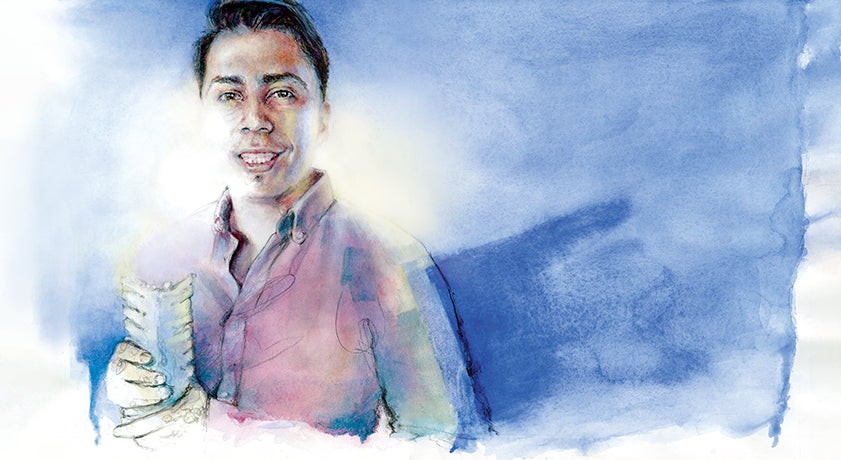
Producing Protection
It was only a year ago, in 2019, when Suntaxi (ENGR ’18) left the United States to return home to Ecuador, ready to begin the next phase of his life. He thought about medical school. But after four years away, he saw that his nation needed his bioengineering skills more than ever, and more immediately.
Using experience gained as a research technician in Pitt’s Department of Orthopaedic Surgery, Suntaxi founded Medical 3D, a start-up, in Sangolquí. The company used 3D printers to produce patient-specific instruments and models that allow physicians to perform more precise surgeries. He became one of a handful of providers in a country of 17 million people.
By spring the next year, Medical 3D was growing, but so was the coronavirus. In mid-March, the crisis essentially locked the country down. Like many other nations, Ecuador faced a shortage of medical PPE and other protections needed for health care workers.
Meanwhile, because elective surgeries had to be suddenly canceled, Suntaxi had to shutter his business.
“I was home, quarantined, and I had my 3D printers. I began to ask myself,” he recalls, “How can I make a contribution?” He came up with an answer—printed facial protections. “They were needed.”
For three weeks, before the Ecuadorian government ramped up its production of PPE, Suntaxi purchased material and used his six 3D printers to make 800 face shields. The early days were slow as he waited for feedback and made modifications for physicians.
Demand picked up when orthopaedic surgeon Walter Siza helped with funding and coordinating distribution of the shields to two large hospitals. And so began Suntaxi’s highway distribution drives in his packed SUV. A friend, Grégori Vásconez, a mechanical engineering student at a local university, also pitched in with printing and delivery. All of the protective shields were donated.
It’s been exhausting, says Suntaxi. He makes about 50 shields a day, each taking about an hour and a half to print. But giving back is not new for him. Since high school, Suntaxi, who is waiting to apply to medical school, has engaged in community service. At Pitt, he was a translator at the Birmingham Free Clinic, which serves much of Pittsburgh’s Hispanic population, among others. When the COVID-19 crisis struck Ecuador, that sense of selflessness kicked in.
“I didn’t want economic profit. Ecuador is in a difficult place, and people have lost jobs,” he says. “I had equipment, so I might as well produce.”
Civil Rights Now
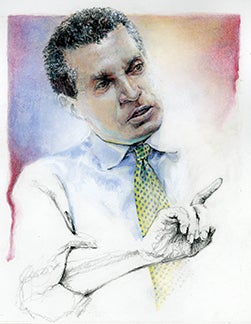 More than 2,800 miles away from Suntaxi, Pittsburgh civil rights activist Tim Stevens sits at home in his rocker watching the news. He takes in the alarming projections of how race, health and economic disparities are making the Black community a particularly vulnerable target for COVID-19. As if that’s not enough, issues of police brutality against Black people are again making the headlines. Stevens (A&S ’67, GSPIA ’74), head of Pittsburgh’s Black Political Empowerment Project and a former long-term leader with the city’s branch of the NAACP, knows all too well what all of it means—too many Black people are going to die. He knows he can’t be silent. He won’t be silent.
More than 2,800 miles away from Suntaxi, Pittsburgh civil rights activist Tim Stevens sits at home in his rocker watching the news. He takes in the alarming projections of how race, health and economic disparities are making the Black community a particularly vulnerable target for COVID-19. As if that’s not enough, issues of police brutality against Black people are again making the headlines. Stevens (A&S ’67, GSPIA ’74), head of Pittsburgh’s Black Political Empowerment Project and a former long-term leader with the city’s branch of the NAACP, knows all too well what all of it means—too many Black people are going to die. He knows he can’t be silent. He won’t be silent.
The veteran activist pounds out a letter on his laptop. Although African Americans make up only 13% of the country’s population, in some states they make up more than 50% of coronavirus cases and deaths. At the outset, Pennsylvania does not keep statistics breaking down cases by race. How can the state and municipalities properly react and help, fumes Stevens, if they don’t know the depth of what is happening?
From his living room—with his dog, Boomer, by his side—he sends letters to local corporate, health, faith and sports leaders, as well as to Pittsburgh’s mayor, Allegheny County’s chief executive and Pennsylvania’s governor. He Zooms with his network of social activists. He mobilizes local media to battle a rapidly spreading myth that Black people can’t catch the virus.
The activist, who says he has seen more than his share of racism, knows where the spotlight must be: “on the absence of housing, wealth, education and other unequal conditions in which people live, which are at levels most people are still not aware of.”
Within weeks, the outreach Stevens helped to jump-start begins to reap positive outcomes. In June, Pennsylvania forms a COVID-19 Response Task Force for Health Disparity, which calls for health care providers to include race when collecting data on positive COVID-19 cases and increases support for community providers working to address the virus. Additionally, following discussions, the Steelers organization agrees to support members of Pittsburgh’s Corporate Equity and Inclusion Roundtable to address the region’s disparities.
Buoyed by these partnerships, he tells local African American leaders—who say they feel pummeled by the crisis—that this time might finally be different, that America is at a pivotal moment. “The COVID crisis has brought a level of sensitivity that has not been there before. People in power can use their influence to make a change,” he says. “We have to use the reality of this moment.”
What's for Dinner?
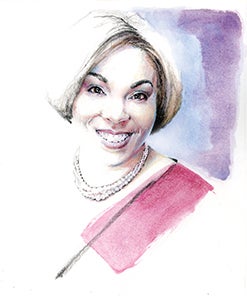 Not too far from Stevens, Marisa Williams steps into a blue van painted with green hearts. Armed with GPS, Williams (A&S ’05), a former community outreach executive with the YMCA, navigates her way to pick up friends. Soon the van seats are filled, and all are singing, channeling their inner Beyoncé. But the masks on their faces, plastic gloves and hand sanitizers are a clue that this isn’t simply a joy ride. Even though a pandemic is raging, the community partners are headed into several of Allegheny County’s distressed communities to deliver food to families.
Not too far from Stevens, Marisa Williams steps into a blue van painted with green hearts. Armed with GPS, Williams (A&S ’05), a former community outreach executive with the YMCA, navigates her way to pick up friends. Soon the van seats are filled, and all are singing, channeling their inner Beyoncé. But the masks on their faces, plastic gloves and hand sanitizers are a clue that this isn’t simply a joy ride. Even though a pandemic is raging, the community partners are headed into several of Allegheny County’s distressed communities to deliver food to families.
Williams is no stranger to helping out. With the YMCA, she has developed initiatives to bolster academic achievement, get people fed and prop up youth. When children can’t get to arts, sports and education programming, she takes her blue-and-green van and Y on the Fly, an innovation in mobile programming, and delivers services directly to them.
The COVID-19 crisis is a new challenge. To tackle it, Williams uses a family philosophy passed along to her when she was a child: “If you don’t take care of your people, no one else is going to.”
She puts this into action. She knows the crisis is going to leave people hungry. She has seen the endless lines of cars waiting at food banks. So, by using her database of the neediest families, she’s going to bring food to the people.
To do so, she reaches out to high-end restaurants for support because, she says, even in the middle of a crisis, “Everyone deserves to have a great experience.”
Brazilian steakhouse Fogo de Chão responds. It makes a two-month commitment and provides meals three times a week: family-sized servings of steak, lamb chops, chicken, side dishes and salads.
Williams and crew drive to the restaurant and load the meals into the van. Map navigator initiated, they set off. In all, they deliver more than 250 meals. Sure, the coronavirus is a lot to fear, she says. “But you can’t be scared and strategic at the same time.”
Pulling up to a family’s home, they ring the bell and leave the food at the front door. The family waves them goodbye. Off they ride, singing all the way.
Care Package
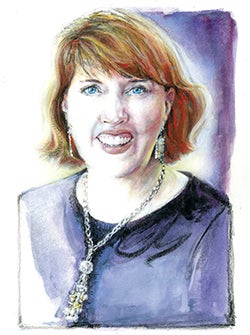 The pandemic has ignited problems beyond food insecurity. In mid-March, an Allegheny County resident calls 2-1-1, United Way’s crisis response hotline. The caller is elderly and vision-impaired, and her caregiver is unable to travel to her because of COVID-19 concerns. The resident feels abandoned. Normally, the 2-1-1 operator would recommend where the caller might go to receive assistance. But the county resident is one of a growing number of people unable to get out on her own. The help needs to come to her.
The pandemic has ignited problems beyond food insecurity. In mid-March, an Allegheny County resident calls 2-1-1, United Way’s crisis response hotline. The caller is elderly and vision-impaired, and her caregiver is unable to travel to her because of COVID-19 concerns. The resident feels abandoned. Normally, the 2-1-1 operator would recommend where the caller might go to receive assistance. But the county resident is one of a growing number of people unable to get out on her own. The help needs to come to her.
Unfortunately, her call is just the tip of the iceberg. Julie DeSeyn (SOC WK ’91, ’93G)—the chief program and policy officer of the United Way, who also helps coordinate 2-1-1—learns that contacts to the hotline have doubled, up to 1,000 a day, from residents needing help with food, utilities, rent and more.
Simultaneously, as people begin to stay home to protect themselves from COVID-19, just how to service 2-1-1 calls has become a critical issue: how will organizations dispatch food, diapers and PPE to the rapidly expanding list of people in need?
United Way reaches out to the foundation community and the Allegheny County Department of Human Services. They ask DeSeyn what, if anything, they can do to help.
DeSeyn, working remotely from her dining room table, assembles a virtual team with expertise in social work, education, policy and project management. She then reaches out to partner agencies. Through a combined effort they cobble together short-term solutions.
Someone at the YWCA will immediately get food for a family in Munhall. Personnel with Macedonia FACE will provide a young mother with guidance on rent assistance.
But the crisis is so great that a long-term, more sustainable solution is needed.
That’s when the Regional Transportation Network is launched. It calls upon partners such as ACCESS, which primarily serves people with disabilities, human service agencies, and seniors; Oasis Transportation, which aids nonprofits; and community-based associates such as the North Side’s Project Destiny and Homewood’s A Second Chance Inc., which have vans and drivers. The team also collaborates with the Alliance for Nonprofit Resources in Butler.
In total, DeSeyn taps into a pool of about 60 drivers. The drivers are licensed, have security clearances and are ready to roll and to service the community, including children and other vulnerable populations.
DeSeyn and her team also secure funding and grants, negotiate contracts and connect drivers to helpful groups and businesses.
“We’re constantly connecting people, and we’re very conscious of partnering with larger groups and smaller, more neighborhood-based groups,” she says. “We want to be community-minded and build on relations of trust.”
The drivers take to the road in late March. By early July, they have crisscrossed more than 10 counties making deliveries to more than 375 community and health centers. In all, they drop off 132,167 meals; 54,560 pounds of boxed food; 2,946 boxes of PPE; and 1,700 boxes of diapers.
“This work,” says DeSeyn, “is about bringing people together. My Pitt studies in community organizing were a great influence on how to make a difference.”
That difference included the elderly Allegheny County resident who had felt abandoned when she called 2-1-1. Care came, via the Regional Transportation Network, in a box of food delivered to her home, thanks to a compassionate, problem-solving response by DeSeyn and her team.
Friend to Friend
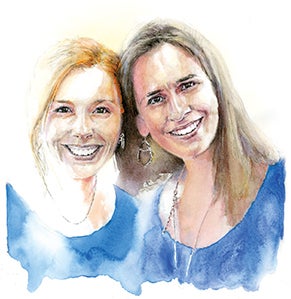 Through it all, teachers everywhere have been dealing with the implications as once-filled classrooms give way to remote learning. That includes Jackie Metcalf and Eliza Luxbacher at the Fanny Edel Falk Laboratory School, a K-8 school affiliated with Pitt’s School of Education. While getting a grasp on how to take learning objectives online and build a rhythm with remote instruction, Metcalf (A&S ’96, EDUC ’98G) and Luxbacher (EDUC ’19, ’20G) realize there is a missing dimension: play.
Through it all, teachers everywhere have been dealing with the implications as once-filled classrooms give way to remote learning. That includes Jackie Metcalf and Eliza Luxbacher at the Fanny Edel Falk Laboratory School, a K-8 school affiliated with Pitt’s School of Education. While getting a grasp on how to take learning objectives online and build a rhythm with remote instruction, Metcalf (A&S ’96, EDUC ’98G) and Luxbacher (EDUC ’19, ’20G) realize there is a missing dimension: play.
Education is social, they say, and there is value in students’ unstructured interactions, friendships and daily connections. They can sense that the children’s isolation is leading to frustration and anxiety, and they feel they need to do something.
Metcalf served as Luxbacher’s mentor, greeting her with a hug when they first met in May last year. They have a mutual admiration that can only come from sharing a teacher’s spirit. Metcalf grew up tidying books in her father’s Titusville, Pennsylvania, elementary classrooms; Luxbacher, from Pittsburgh’s Upper St. Clair suburb, had a special bond with a fourth grade teacher. Every year, until she started college, she’d show up and help set up the teacher’s classroom.
Soon after COVID-19 hit, recalls Metcalf, “We were looking for ways to honor the students’ community. Not just academic, but where the students share common interests, too.”
Luxbacher, too, felt that despite all of the physical distancing, it was important to “provide opportunities for them to see each other’s faces and normalize it, make it a friendship.”
The two educators became part of the idea team that created four activities for the school’s fourth graders. The students tumble into Zoom at 10:30 a.m. on Friday; but instead of math or reading, they get to chat about their days and nights as they join clubs for origami, astronomy, arts and crafts, or Lego building.
The weekly creation and recreation time quickly takes off. In astronomy, they study black holes and calculate distances to the moon. A local physics professor (a student’s parent) is the club’s advisor. Back on Earth, the Lego club hosts innovation challenges. There are opportunities to build a mode of transportation, and designs are shared via slideshows. In arts and crafts, students post an art gallery of their drawings.
Underneath it all, something remarkable happens. The students begin to share more than just drawings, Lego cars and theories about black holes. The play sessions become spaces of compassion and genuine concern. “The kids are talking about what’s going on in their lives. It’s the kind of connection you don’t usually see unless people are face to face,” says Luxbacher.
One student shares the sad news that his cousin has passed away because of a heart ailment. Metcalf notices that the student wants his friends to help him process his grief. She’s further moved that the classmates respond by listening, asking questions, having sympathy and offering words of comfort.
Managing young students on Zoom can be tricky, reflects Metcalf, who’s been a teacher for 22 years. They tend to talk out of turn and lose concentration. But, she says, “what we saw, the support for each other, was incredibly sweet.”
Finding the Helpers
Pitt alumni are known for their giving spirits. This story highlights only a few of the many out there making a difference amid the pandemic. Are you, or is someone you know, a “helper”? Let us know at pittmag@pitt.edu.
This article appears in the Fall 2020 edition of Pitt Magazine.

